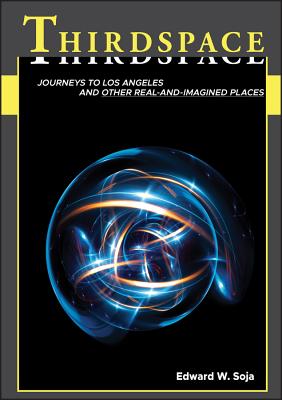Thirdspace

Thirdspace
Contemporary critical studies have recently experienced a significant spatial turn. In what may eventually be seen as one of the most important intellectual and political developments in the late twentieth century, scholars have begun to interpret space and the embracing spatiality of human life with the same critical insight and emphasis that has traditionally been given to time and history on the one hand, and social relations and society on the other. Thirdspace is both an enquiry into the origins and impact of the spatial turn and an attempt to expand the scope and practical relevance of how we think about space and such related concepts as place, location, landscape, architecture, environment, home, city, region, territory, and geography.
The book's central argument is that spatial thinking, or what has been called the geographical or spatial imagination, has tended to be bicameral, or confined to two approaches. Spatiality is either seen as concrete material forms to be mapped, analyzed, and explained; or as mental constructs, ideas about and representations of space and its social significance. Edward Soja critically re-evaluates this dualism to create an alternative approach, one that comprehends both the material and mental dimensions of spatiality but also extends beyond them to new and different modes of spatial thinking.
Thirdspace is composed as a sequence of intellectual and empirical journeys, beginning with a spatial biography of Henri Lefebvre and his adventurous conceptualization of social space as simultaneously perceived, conceived, and lived. The author draws on Lefebvre to describe a trialectics of spatiality that threads though all subsequent journeys, reappearing in many new forms in bell hooks evocative exploration of the margins as a space of radical openness; in post-modern spatial feminist interpretations of the interplay of race, class, and gender; in the postcolonial critique and the new cultural politics of difference and identity; in Michel Foucault's heterotopologies and trialectics of space, knowledge, and power; and in interpretative tours of the Citadel of downtown Los Angeles, the Exopolis of Orange County, and the Centrum of Amsterdam.
PRP: 305.55 Lei
Acesta este Prețul Recomandat de Producător. Prețul de vânzare al produsului este afișat mai jos.
275.00Lei
275.00Lei
305.55 LeiLivrare in 2-4 saptamani
Descrierea produsului
Contemporary critical studies have recently experienced a significant spatial turn. In what may eventually be seen as one of the most important intellectual and political developments in the late twentieth century, scholars have begun to interpret space and the embracing spatiality of human life with the same critical insight and emphasis that has traditionally been given to time and history on the one hand, and social relations and society on the other. Thirdspace is both an enquiry into the origins and impact of the spatial turn and an attempt to expand the scope and practical relevance of how we think about space and such related concepts as place, location, landscape, architecture, environment, home, city, region, territory, and geography.
The book's central argument is that spatial thinking, or what has been called the geographical or spatial imagination, has tended to be bicameral, or confined to two approaches. Spatiality is either seen as concrete material forms to be mapped, analyzed, and explained; or as mental constructs, ideas about and representations of space and its social significance. Edward Soja critically re-evaluates this dualism to create an alternative approach, one that comprehends both the material and mental dimensions of spatiality but also extends beyond them to new and different modes of spatial thinking.
Thirdspace is composed as a sequence of intellectual and empirical journeys, beginning with a spatial biography of Henri Lefebvre and his adventurous conceptualization of social space as simultaneously perceived, conceived, and lived. The author draws on Lefebvre to describe a trialectics of spatiality that threads though all subsequent journeys, reappearing in many new forms in bell hooks evocative exploration of the margins as a space of radical openness; in post-modern spatial feminist interpretations of the interplay of race, class, and gender; in the postcolonial critique and the new cultural politics of difference and identity; in Michel Foucault's heterotopologies and trialectics of space, knowledge, and power; and in interpretative tours of the Citadel of downtown Los Angeles, the Exopolis of Orange County, and the Centrum of Amsterdam.
Detaliile produsului











